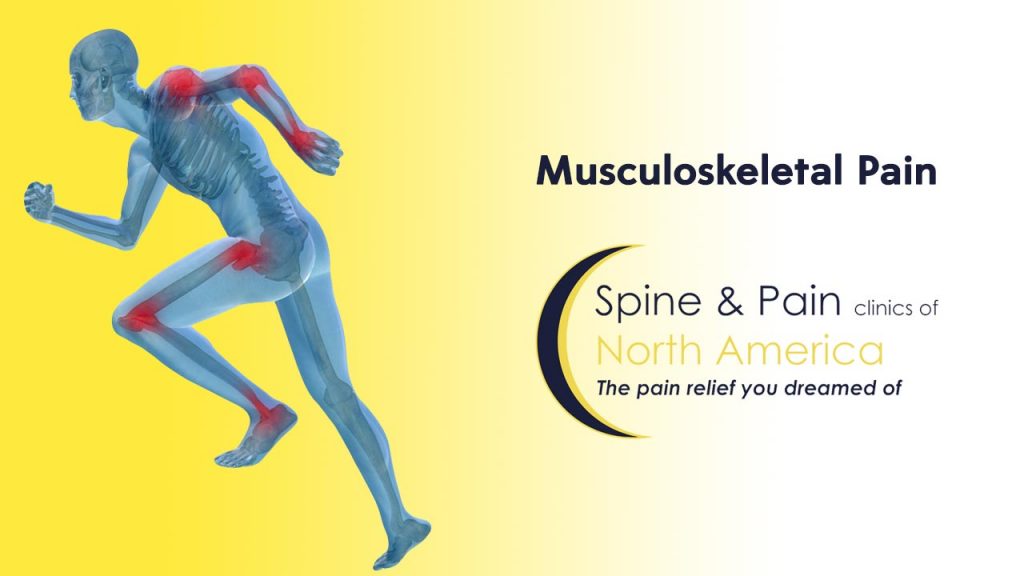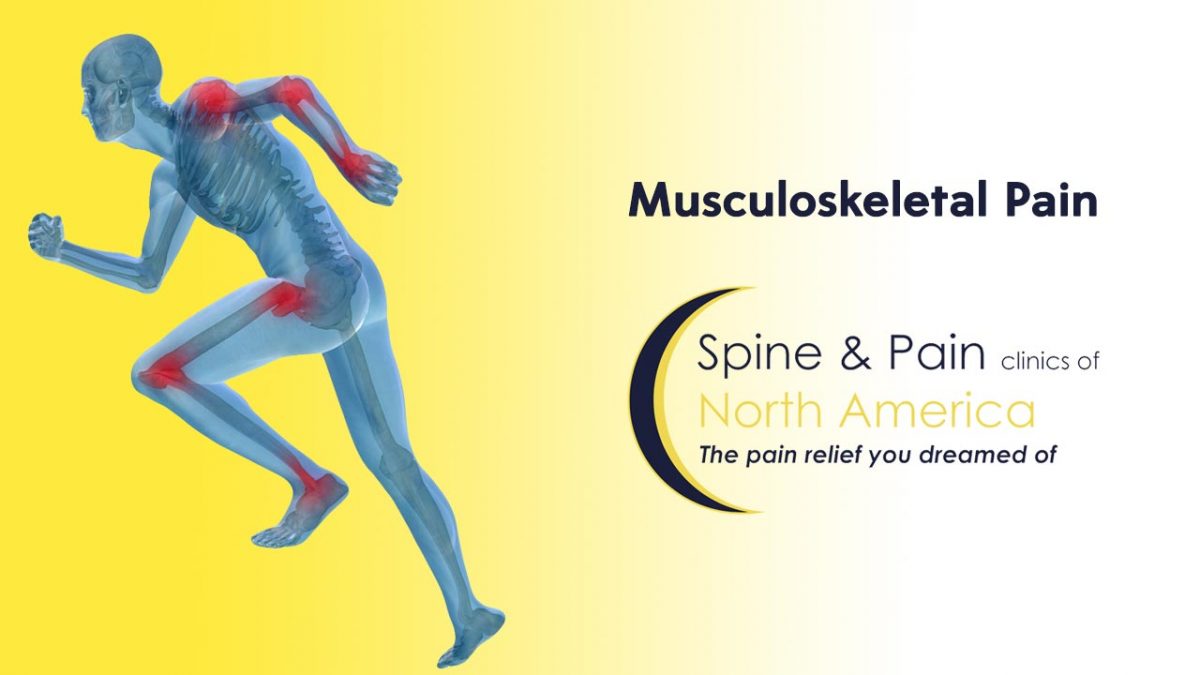![]()
Call (703) 520-1031 or use the form to send us your contacts.

Musculoskeletal pain is a common complaint that has multiple underlying causes. That explains why a musculoskeletal doctor may have difficulty making a diagnosis. In many cases, pain is related to a musculoskeletal disorder such as fibromyalgia. Regardless, chronic musculoskeletal pain can be depressing or interfere with the functions of daily living. However, treatments are available to help you manage the symptoms.
Continue reading for more on the causes, symptoms, and treatment options, and also to get answers to the top frequently asked questions.
What Does Musculoskeletal Pain Mean?
The term musculoskeletal pain describes pain in the muscles, bones, joints, ligaments, and tendons that make up the musculoskeletal system. Commonly affected areas of the body are the back and neck, shoulders, chest, wrists, hips, thighs, knees, legs, and feet. You may feel the pain in one specific area of your body, such as your lower back. Musculoskeletal lower back pain is the most common type of chronic musculoskeletal pain.
Pain is also widespread in other cases, as seen in patients diagnosed with fibromyalgia. Sometimes, it is sudden and severe but short-lived (acute pain) or mild and continuous for months (chronic pain). Widespread pain usually results from pain in one or more areas of the body.
Causes of Musculoskeletal Disorders and Pain
There are different types of musculoskeletal pain disorders. For example, there is musculoskeletal back pain, which is often caused by an accident, fracture, fall, or spinal dislocation. Other common causes of musculoskeletal disorders include:
- Inflammatory disorders such as osteoarthritis, rheumatoid arthritis, gout, lupus, and ankylosing spondylitis
- Muscle loss from overuse
- Muscle, tendon, or ligament sprain or strain
- Osteoporosis
- Chronic inflammation
- Prolonged sitting or poor posture
- Structural problems, e.g., an abnormal curvature of the spine or scoliosis
- Nerve compression, e.g., a pinched lumbar spine nerve
Symptoms of Musculoskeletal Pain
Musculoskeletal disorders may trigger pain at the location of the injury or dysfunction, but the pain may travel to other body areas via the nerve pathways. Patients often complain of feeling full-body aches or as if they have overworked their muscles. Other common symptoms include:
- Muscle spasms
- Burning sensation
- Fatigue
- Body stiffness
- Pain that worsens with movement
- Sleep disturbances
Diagnosing Musculoskeletal Pain
Your doctor will do a thorough physical examination and go over your medical history. You may be asked questions about the nature of the pain, other symptoms, and what improves or worsens the pain. In addition, your doctor may run diagnostic tests to determine the underlying cause or disorder linked to your symptoms. Routine tests include:
- Blood tests
- Test for inflammation markers or levels
- X-rays or CT scans to check for bone problems
- MRI to screen for issues with the soft tissue in the musculoskeletal system
Musculoskeletal Pain Treatment
Treatment can begin with your primary care doctor but may involve additional care from a specialist such as a rheumatologist, osteopath, orthopedist, or physical therapist. The recommended treatment option will depend on the diagnosis and may include the following.
• Medication
Includes topical analgesics and nonsteroidal anti-inflammatory drugs (NSAIDs), e.g., Ibuprofen, opioids, and steroid injections.
• Physical or occupational therapy
Involves therapeutic exercises and stretches to relieve stiffness and improve muscle and bone function.
• Osteopathic manipulation
This treatment is especially beneficial for people with musculoskeletal back pain. It involves using gentle pressure and stretches to relieve pain, heal inflamed tissue, and increase flexibility.
• Chiropractic adjustment or manipulation
It helps restore spinal alignment and relieve pain associated with a pinched nerve or musculoskeletal dysfunction.
• Alternative therapies
For example, herbal medicine, dietary supplements, acupuncture, or massage therapy for reducing inflammation and minimizing pain.
• Relaxation & biofeedback techniques
Relaxation and meditation can help regulate how your body perceives pain.
• Surgery
If other treatments fail, your doctor may recommend a surgical procedure such as soft tissue and cartilage repair or joint replacement as a last resort.
Lifestyle changes such as hot/cold therapy, stretches, and exercises are also helpful in alleviating aches, pain, stiffness, and inflammation.
Musculoskeletal Pain FAQs
Here are answers to the top questions to help you get a broader understanding of musculoskeletal pain.
What is chronic musculoskeletal pain?
Chronic musculoskeletal pain is pain that lasts more than 12 weeks (3 months). Many people complain of chronic musculoskeletal lower back pain. That’s because the spine and connective tissue in the lower back are more prone to overuse, injury, misalignment, inflammation, or arthritis.
What does musculoskeletal pain feel like?
People with musculoskeletal pain typically complain of full-body aches or as if their muscles have been overworked. Widespread aching may be accompanied by muscle twitching or spasms and an overall feeling of fatigue.
How long does musculoskeletal pain last?
The pain can last a few days, weeks, or months. It can come and go or feel like a nagging continuous ache. The timeline ultimately depends on the cause and the effectiveness of treatment or therapy.
What is musculoskeletal chest pain?
Musculoskeletal chest pain refers to pain related to an injury or inflammation of the muscles or bones of the chest wall. Other causes include referred pain from musculoskeletal disorders such as fibromyalgia or arthritis.
